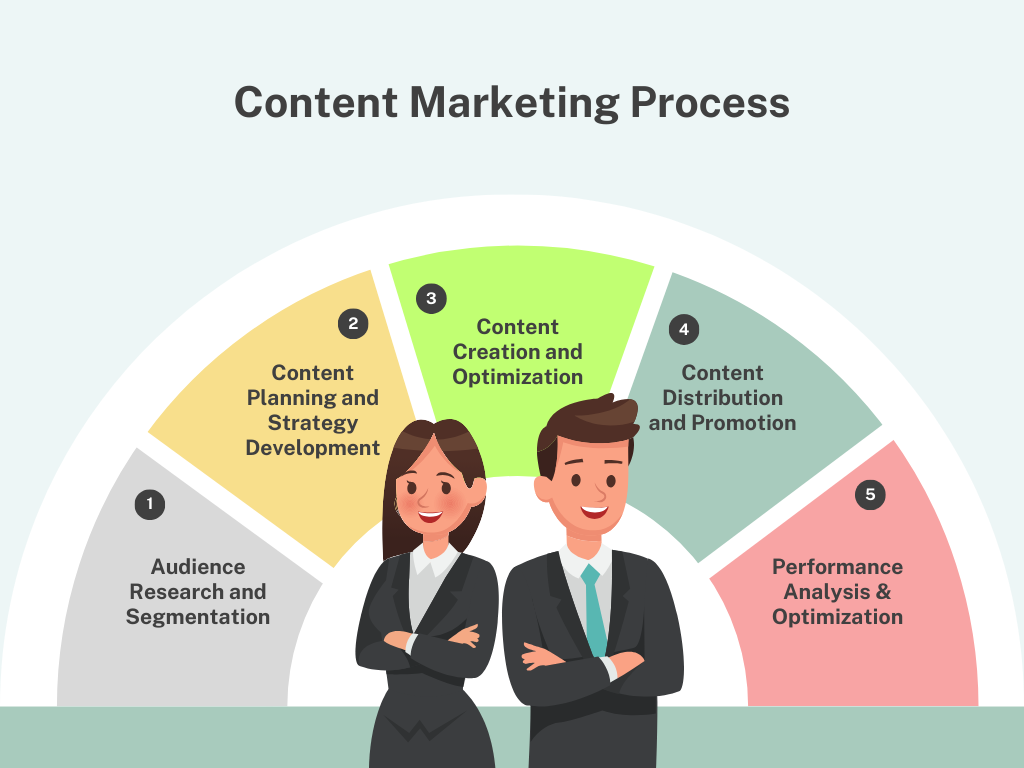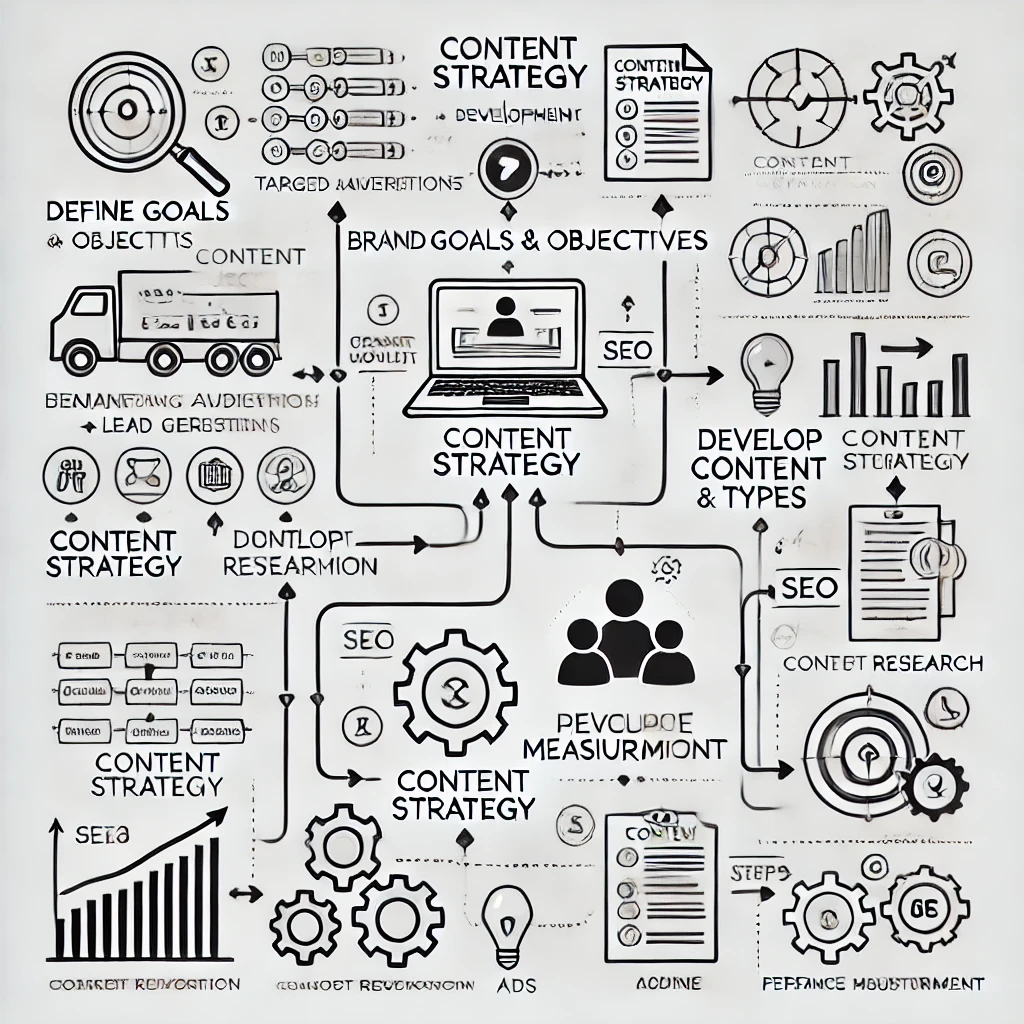The content marketing strategist is crucial for a business’s digital growth and online expansion. Businesses should hire content marketing strategists to build their reputation and develop customer relationships that lead to sales and better connections with their audience. Content marketing strategists are vital to this process. These planners design and guide successful content efforts.
In this blog post, we will discuss the role of content marketing strategists and explain the skills and qualifications they need to succeed.
What is a Content Marketing Strategist?
A content marketing strategist is an expert who creates and manages strategies that help businesses reach their marketing and sales goals. The role involves researching the audience, creating content, and distributing it across various channels. It also includes monitoring performance to improve future campaigns. According to a content marketer, 85% of marketers see content as a key business strategy. This highlights the important role strategists play in business growth.
A content marketing strategist works with marketing and sales teams and design professionals to ensure that all content aligns with the brand’s voice and meets its goals and audience needs. They develop a communication strategy for a company’s target audience by using formats such as blog posts, social media updates, videos, and email marketing.
According to Ann Handley who is an expert in content marketing strategies “Good content goes beyond just telling good stories.” The fundamental principle that guides content strategists is the ability to communicate true stories effectively.
The Role of a Content Marketing Strategist
The role of a content marketing strategist is complex. It combines creativity, strategic thinking, and technical skills. Here are some of the main responsibilities of a content marketing strategist:

1. Audience Research and Segmentation
Understanding the audience is essential for every successful content marketing strategist. They must conduct thorough research to find important insights about the target audience. This includes their demographics, interests, pain points, and online behaviors. Statistics show that businesses that focus on audience research are 75% more likely to create content that connects with their audience and encourages engagement.
By leveraging tools like Google Analytics, a strategist can develop a detailed audience persona. This persona guides the creation of personalized and relevant content, ensuring that each piece addresses the audience’s needs and preferences. As Neil Patel, a digital marketing expert, emphasizes, “When you know your audience, half the battle is won.” This targeted approach not only fosters stronger connections with the audience but also significantly improves the overall performance of marketing campaigns.
2. Content Planning and Strategy Development
A content marketing strategist creates a detailed plan for making and sharing content. This plan outlines what content will be produced, when it will be released, and how it will be shared. It serves as a roadmap, guiding the company in reaching its marketing goals and improving its online presence through SEO and enhancing online presence through SEO.
An essential part of this strategy is the content calendar. This tool helps organize when and how to share content. It outlines timelines, themes, and key publishing dates. This keeps teams consistent and helps them stay on schedule. HubSpot research shows that marketers who utilize content calendars are 60% more likely to produce timely, high-quality content. This clear method not only simplifies workflow but also improves the effectiveness of marketing efforts across multiple channels.

Tools need to be used: Project management tools like Trello or Asana
3. Content Creation and Optimization
Content marketing strategists may not always write the content themselves, but they are essential in making sure it is high-quality, relevant, and optimized for search engines. Their tasks include conducting detailed keyword research to find opportunities that match audience interests and search intent. According to BrightEdge, 68% of all online experiences , start with a search engine. This highlights the importance of SEO in content marketing.
4. Content Distribution and Promotion
A well-crafted piece of content is only effective if it reaches the right audience. This is where content strategists excel. They look at audience behavior and preferences to find the best platforms and channels for distribution. Whether it’s blogs, social media, email newsletters, or third-party websites, each channel serves a specific role in reaching and engaging the target audience.
According to a study by Statista, 54% of marketers said social media is their most effective distribution channel. Email marketing also shows impressive returns, with $36 earned for every $1 spent. These insights help strategists choose the right mix of platforms to increase content visibility and impact.
By adapting content formats and messages for each channel, strategists make sure that content not only reaches the intended audience but also encourages interaction and engagement. As marketing expert Joe Pulizzi says, “Delivering content to the right person at the right time is not just smart; it’s necessary.” This focused approach improves the effectiveness of content campaigns and produces measurable results.
5. Performance Analysis and Optimization
Required Skills and Traits of a Content Marketing Strategist
A content marketing strategist needs a variety of skills to succeed in their role. Here are some of the most important skills and traits that help them create effective and results-oriented content strategies:
1. Strong Writing and Communication Skills
At its heart, content marketing is about creating valuable, engaging, and well-written content. Strategists must be good at writing blogs, social media posts, and email campaigns that explain complex ideas clearly and in a relatable way. A Content Marketing Institute survey found that 82% of marketers view quality content as a key factor in audience engagement, highlighting the need for strong communication skills.
2. Expertise in SEO
A solid understanding of SEO is crucial for making content visible. Skills in keyword research, on-page optimization, and link-building are essential for ranking well on search engines like Google. BrightEdge reports that organic search accounts for 53% of all website traffic, making SEO know-how a fundamental part of any content strategy.
3. Analytical Thinking
Strategists need to interpret data from tools like Google Analytics, SEMrush, or HubSpot to spot trends and performance issues. Their ability to analyze metrics such as traffic, conversion rates, and engagement supports data-driven decision-making. This analytical approach helps improve content strategies over time.
4. Creativity and Innovation
In a crowded digital space, being unique requires creative thinking. Content strategists should come up with fresh ideas for formats like videos, infographics, or interactive content that engage audiences and build brand loyalty. A recent Adobe study showed that 73% of consumers prefer brands that show creativity in their content.
5. Project Management
Content marketing strategists often work with multiple teams, including writers, designers, and developers. Good organizational skills, the ability to set clear deadlines, and prompt publication are important for maintaining consistency and efficiency across campaigns.
Obstacles and Misconceptions Encountered by Content Marketing Strategists
Despite its clear impact, the role of a content marketing strategist is often misunderstood. Many people think that content marketing is just about writing blog posts, but it actually includes many formats, such as videos, podcasts, whitepapers, and social media campaigns. A strategist makes sure that the content meets business goals, connects with the target audience, and is distributed effectively across various channels.
Another common misunderstanding is that content marketing provides instant results. In truth, it is a long-term strategy that needs consistency, improvement, and audience engagement over time. A content marketing strategist reviews performance metrics, refines strategies, and ensures ongoing development to achieve lasting growth.
Quality is also a crucial factor in content marketing success. Some businesses think that producing a lot of content guarantees visibility, but poorly researched or irrelevant content can damage a brand’s credibility. A strategist emphasizes creating high-quality, valuable content that satisfies audience needs and builds brand authority.
The value of content marketing is backed by evidence. Research shows that 70% of consumers prefer learning about a company through articles instead of ads (Content Marketing Institute). Companies that post 13 or more blog articles each month receive 97% more inbound links (HubSpot), showing that regular content creation improves SEO. Furthermore, 93% of marketers use social media to share content, highlighting its role in engaging the audience (Social Media Examiner). Additionally, 72% of marketers report increased engagement through content marketing, while 63% say it helps attract leads (Demand Metric).
By correcting these misunderstandings and using data-driven insights, businesses can unlock the full potential of content marketing. A clear strategy, guided by a skilled content marketing strategist, allows brands to raise awareness, build customer relationships, and achieve long-term success online.

